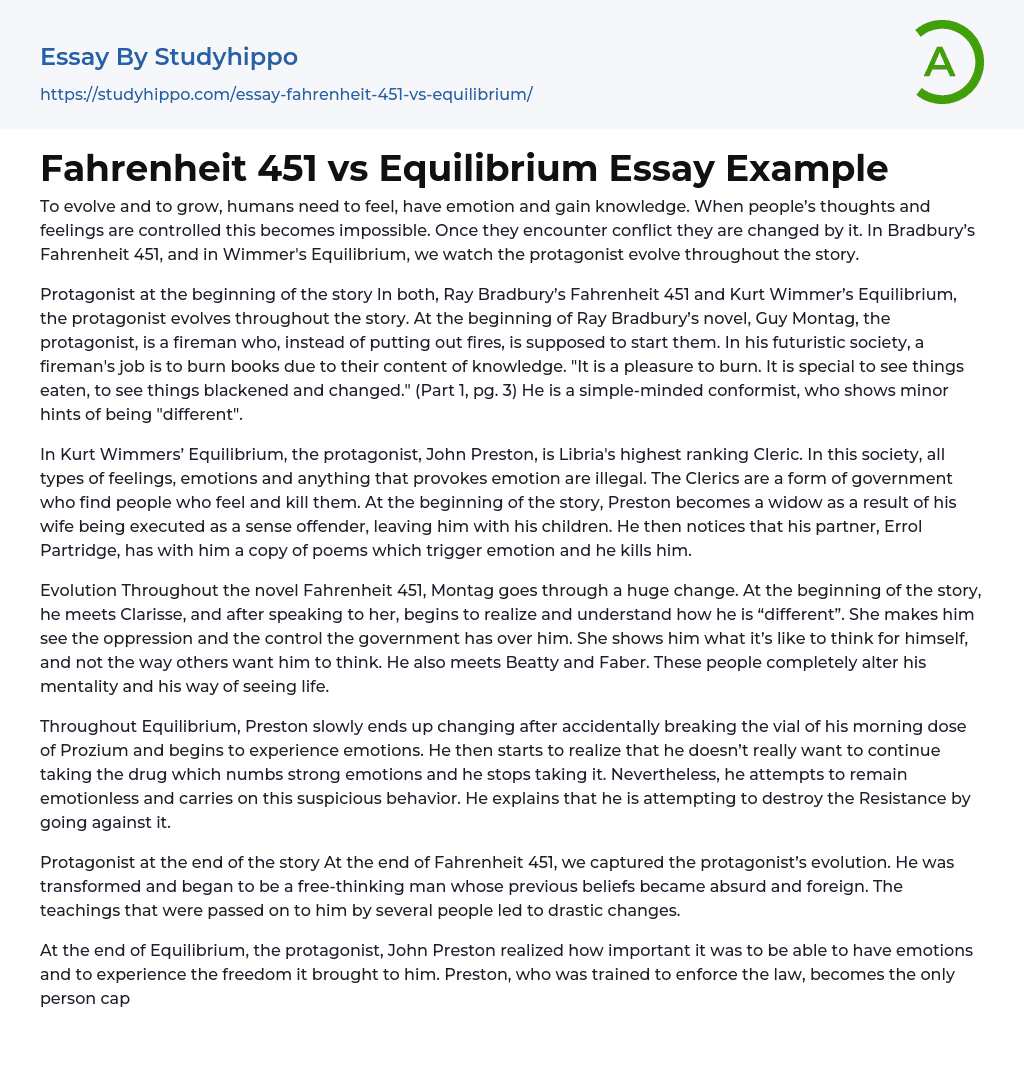To evolve and to grow, humans need to feel, have emotion and gain knowledge. When people’s thoughts and feelings are controlled this becomes impossible. Once they encounter conflict they are changed by it. In Bradbury’s Fahrenheit 451, and in Wimmer's Equilibrium, we watch the protagonist evolve throughout the story.
Protagonist at the beginning of the story In both, Ray Bradbury’s Fahrenheit 451 and Kurt Wimmer’s Equilibrium, the protagonist evolves throughout the story. At the beginning of Ray Bradbury’s novel, Guy Montag, the protagonist, is a fireman who, instead of putting out fires, is supposed to start them. In his futuristic society, a fireman's job is to burn books due to their content of knowledge. "It is a pleasure to burn. It is special to see things eaten, to see things blackened and cha
...nged." (Part 1, pg. 3) He is a simple-minded conformist, who shows minor hints of being "different".
In Kurt Wimmers’ Equilibrium, the protagonist, John Preston, is Libria's highest ranking Cleric. In this society, all types of feelings, emotions and anything that provokes emotion are illegal. The Clerics are a form of government who find people who feel and kill them. At the beginning of the story, Preston becomes a widow as a result of his wife being executed as a sense offender, leaving him with his children. He then notices that his partner, Errol Partridge, has with him a copy of poems which trigger emotion and he kills him.
Evolution Throughout the novel Fahrenheit 451, Montag goes through a huge change. At the beginning of the story, he meets Clarisse, and after speaking to her, begins to realize
and understand how he is “different”. She makes him see the oppression and the control the government has over him. She shows him what it’s like to think for himself, and not the way others want him to think. He also meets Beatty and Faber. These people completely alter his mentality and his way of seeing life.
Throughout Equilibrium, Preston slowly ends up changing after accidentally breaking the vial of his morning dose of Prozium and begins to experience emotions. He then starts to realize that he doesn’t really want to continue taking the drug which numbs strong emotions and he stops taking it. Nevertheless, he attempts to remain emotionless and carries on this suspicious behavior. He explains that he is attempting to destroy the Resistance by going against it.
Protagonist at the end of the story At the end of Fahrenheit 451, we captured the protagonist’s evolution. He was transformed and began to be a free-thinking man whose previous beliefs became absurd and foreign. The teachings that were passed on to him by several people led to drastic changes.
At the end of Equilibrium, the protagonist, John Preston realized how important it was to be able to have emotions and to experience the freedom it brought to him. Preston, who was trained to enforce the law, becomes the only person capable of destroying the government and freeing the prisoners from death.
Conclusion As seen throughout the stories, both protagonists start off by following the law and then turn out to be someone who challenges it. They both transform from simple minded conformists to fundamental men who work on reshaping society.
- Age Of Enlightenment essays
- Ethos essays
- Time essays
- Acceptance essays
- Meaning Of Life essays
- Reality essays
- Natural Law essays
- Political Philosophy essays
- Utilitarianism essays
- Existence essays
- Free Will essays
- Good And Evil essays
- Confucianism essays
- Relativism essays
- Conscience essays
- Environmentalism essays
- Empiricism essays
- Epistemology essays
- Ethics essays
- Existentialism essays
- Human Nature essays
- Individualism essays
- Metaphysics essays
- Philosophy Of Life essays
- Transcendentalism essays
- Truth essays
- Destiny essays
- Determinism essays
- Fate essays
- Functionalism essays
- Philosophers essays
- Pragmatism essays
- Future essays
- Child Observation essays
- Critical Reflection essays
- Teaching Philosophy essays
- Personal Philosophy essays
- Action Speak Louder Than Words essays
- Can Money Buy Happiness essays
- Values of Life essays
- Ethical dilemma essays
- Normative Ethics essays
- Virtue Ethics essays
- Belief essays
- Deontology essays
- Moral essays
- Virtue essays
- Work Ethic essays
- Henry David Thoreau essays
- Carl Jung essays




